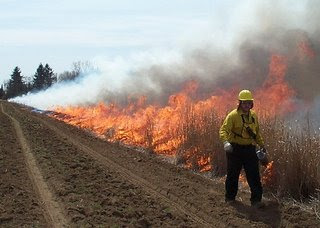
Before the oil runs out, scientists and engineers are hard at work figuring out alternatives.
"Grassoline." The word has a ring to it. It's catchy. "Grassoline" is easier to say than "cellulosic biofuel" but it means much the same thing. In the search for petroleum substitutes, ethanol made from switchgrass is a leading alternative. Switchgrass is cheap, abundant and doesn't compete with food crops. Citing a yet to be released study by the Department of Energy, George Huber and Bruce Dale say that the U.S. can produce enough cellulosic biomass every year to meet at least half of our petroleum energy requirements—and all without decreasing the amount of crops available for our food, animal feed or exports. In fact, using those numbers, the world can produce a lot more biomass than we would need to fill the global demand for fuel.
There's a catch. of course. Facilities to convert straw into liquid gold are, for now at least, prohibitively expensive. It's estimated that using current technology, a plant designed to produce 34,000 barrels of oil a day—a mere drop in the bucket of global demand—would cost over a billion dollars. Then, if it could be stoked with five thousand tons of cellulosic material each and every day for thirty years or so, it would pay for itself. There are cheaper and better ways to do it, but they haven't been perfected yet.
Maybe the plant matter would be better used as composted fertilizer and mulch, a natural way of maintaining a balance of nutrients in the soil. As for me, I was hoping for a personal model grass converter. I'd like to be able to throw my clippings in a hopper and power my lawn mower with them. Or is that too "back to the future?"
No comments:
Post a Comment